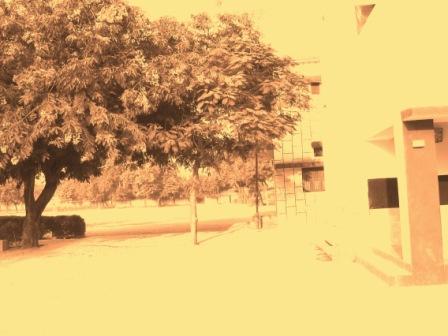Lit Up with the Beloved's BeautyBy
Hasrat MohaniTranslated from
the Urdu by Siyaah
Lit up with the beloved's beauty, is the assembly entire
Kindled with the blossom's fire, is the garden entire. [1]
Expressing surprise with vanity, anxiety with jest
Your heart too has learned the beloved's repertoire entire. [2]
O God, how unique is the beloved's body, that by itself
Drowned in colours is the raiment entire. [3]
Do see the enchanting gaze of the beloved's eyes
Struck unconscious in a glance, is the assembly entire. [4]
Meer's burning and melting is the sweetness of a breeze
Hasrat, in front of your verses pales the world of poetry entire. [5]
Translator's Notes
[1] Roshan: signifying light, as in 'lit up', contrast with Deheka in the next line, for which I have used the closest expression as 'kindle' which conveys the precise implications of 'set fire to; fuel; cause to glow'; Jamaal: beauty, elegance; Anjuman: assembly, meeting; Tamaam: entire, complete (but also see last note).
[2] Hairat: surprise, astonishment; Ghuroor-e-husn: pride of beauty, implying vanity; Shokhi: playfulness, jest, mirth; Izteraab: agitation, excitement, anxiety, restlessness, fear.
"Chalan (tamaam)" is here a kind of colloquial usage implying the beloved's ways, and had to rendered with some creativity using the expression "beloved's repertoire (entire)"
[3] Jism-e-yaar: body of beloved; Pairaahan: raiment, garment
[4] Chashm-e-yaar: eyes of beloved; The couplet has an interesting duality: does the 'glance' in the second line refer to the assembly looking at the beloved's eyes (especially in the context of the exhortation in the first line "Do see"), or the beloved casting a glance at the assembly? I think the latter would be the simpler interpretation.
[5] This was the most challenging couplet.
Sheerini-e-naseem: Sweetness of breeze; Sheerin generally means sweet, but can also refer to pleasant, gentle, affable, particularly as a characteristic of manners or speech.
Soz-e-gudaaz: literally Soz means Burning (implying heartrending, plaintive) and Gudaaz means Melting (implying tragic, heartbreaking). Soz-e-gudaaz is a Persian poetic expression often used for speech or poetry that is plaintive and tragic.
Sukhan: verses; Lutf-e-sukhan: Essence of verses / poetry
The last verse was difficult to rhyme with the rest in translation, as interestingly, the poet employs a different derived meaning of 'Tamaam' here i.e. 'to end' or 'to finish off'. This had to be rendered creatively with the introduction of 'world of poetry' to end with 'entire'.
Also, the poet's invocation of the one of the best known Urdu poets,
Meer, in the last couplet is interesting. While praising Meer's works, he immediately follows it up with the highest praise for his own poetry (self-praise is not uncommon amongst Urdu poets). Also, I wonder if the metaphors used to describe Meer's works are somewhat tongue-in-cheek: It could be read as implying that all of Meer's burning and melting is but the sweetness of a breeze i.e. is not plaintive or heartrending enough, when compared with Hasrat's own works.





